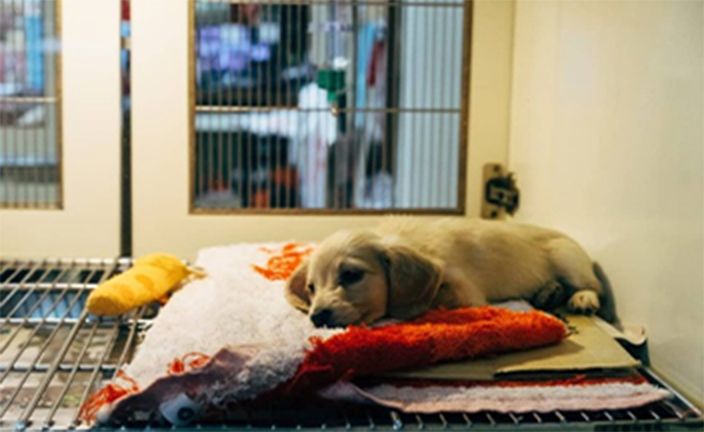Reliable Veterinary Staff Can Enable Wider Social Impact Initiatives
Posted by Douglas Carlson on May 7, 2020
Corporate responsibility is no short-lived trend. In fact, it’s only grown momentum over the last five years as more corporations, investors, and consumers make spending decisions based on company values. The impact a company has on its community, workers, and the world at large also informs financial success.
While all industries are moving toward some level of social responsibility, corporate veterinary practices like Banfield have been focused on making a difference for years. Heading into its fifth year of service, the Banfield Foundation is committed to a better world for pets and ensuring organizations that assist animals and their humans are prepared to do so. Having credentialed, passionate veterinary staff both in their hospitals nationwide, and in their corporate offices is vital to their continuously growing social impact initiatives.

How doing good can help your practice do well
Kim Van Syoc, Executive Director of the Banfield Foundation, believes that making a positive impact in the community and the world in which we live is essential to success as a brand. “I don’t know how you can grow your brand without doing good,” she said. Data from several studies conducted over the last few years prove that statement true.
According to a 2017 Cone Communications study, 87% of consumers say they’re more likely to purchase a product or service from a company that aligns with their values and 55% are willing to pay extra for products or services from a company that is dedicated to having a positive social impact. 67% of employees in a Nielsen report say they prefer to work for socially responsible companies. Another study found that 69% of respondents believe that it is extremely important for US companies to act socially responsible.
Social impact, then, is no longer a bonus for a company but rather a necessity. As a younger, socially-focused generation joins the workforce and millennials and Generation Z continue to influence cultural values, companies that hope to thrive need to focus on doing good for their communities.
Increasing your social impact initiatives does more than appeal to socially-minded clients; it can help increase the reach of your business, bring in new clients, and build trust locally. But it also needs to be genuine. Building a comprehensive and authentic outreach program, whether you’re a large practice or a small one, has long-term benefits. These include:
- Increased brand awareness. What makes your practice stand out from other local veterinary clinics? While you can pay for ad space in newspapers, online, and on local television, you’re competing with other businesses doing the same. Instead, becoming involved in local charities, volunteer opportunities, and more, can ensure you’re remembered and grow your brand over time - and often for a much smaller investment.
- Increased employee retention. High turnover can decrease your chances of success as a veterinary practice. If employees are constantly leaving, the quality of care for patients takes a hit, you’re unable to schedule as many appointments, and can face negative reviews from unhappy clients. By offering the opportunity to take part in volunteer initiatives, you’re building your brand and taking an active role in the community that will pay off. In fact, a Deloitte study found that millennials who believed their employer supports the local community were 38% more likely to stay at the company for five years or more. Additionally, staff turnover rates are 25-50% lower at responsible companies versus those who don’t invest in their values and community.
- Increased revenue. Investing in community outreach and social impact programs may, at first, seem like a spend that won’t have much impact on your bottom line. However, purpose-focused companies have been found to outperform their peers in terms of revenue1.
How to begin focusing on social impact
For Banfield, credentialed veterinary technicians are one part of what allows the company to dedicate time and resources to social impact initiatives. In 2019 alone, the foundation was able to help over 2 million pets get the care they need. They’ve sent veterinarians and certified veterinary technicians abroad to help at-risk populations and pets. They provided disaster relief, helping disadvantaged families care for their animals.
Creating a social impact program for your practice isn’t done overnight, but the first step is often ensuring that you have reliable staff. For veterinary practices, that means having credentialed veterinary technicians and confident practice managers who can take on vital roles supporting the veterinarians. Allowing technicians to take appointments can free up time to focus on what your business can do to make a difference in your local community. Further, your credentialed veterinary technicians can take part in making a positive difference through low-cost clinics, volunteering at shelters, and more.
As a veterinary practice, you’re already dedicated to making a difference for the pets you see so taking more responsibility for helping animals in your community is a natural next step.
Provide training to upskill your staff and increase your social impact potential
With Penn Foster’s online Veterinary Academy, you can provide proven training for veterinary technicians, assistants, and more. You’ll increase your employee’s confidence, gain licensed or registered vet techs that can grow your business, and have the opportunity to make a bigger difference in the world you live in. Contact a training expert today to get started.
Source: Rajendra Sisodia, David Wolfe, and Jagdish Sheth, Firms of Endearment: How World-Class Companies Profit from Passion and Purpose (Upper Saddle River, NJ: FT Press, 2007)